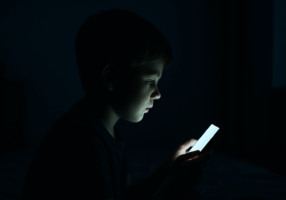Phillip de Wet , Business Insider SA
May 17, 2019, 04:05 PM
- A proposed legal update will make it a crime to so much as hand a child any computer or cellphone capable of accessing pornography in South Africa.
- That’s just about the only viable way to keep kids away from porn, a comprehensive review by the SA Law Reform Commission has found.
- For adults, getting access to porn would require showing an ID, and being noted down in a register.
- Even if the proposal is accepted as it stands, it won’t be nearly as strict as prosecutors and others would like to see – including banning all porn outside of adult shops.
If Parliament accepts a proposal by the SA Law Reform Commission (SALRC), a new crime will be created in South Africa: giving a child a cellphone that is capable of accessing the internet while not having a porn blocker in place.
Manufacturers of cellphones would be specifically targeted, but under a broad proposed wording the law would apply to anyone who “provides a child” with such a device or allows a child to “engage with” one. That could include, say, an adult who hands over a cellphone for a child to play with.
The crime would be a serious one, directly equivalent to showing a child what will in future likely be termed “child sex abuse material”, under another proposed update, but which is currently known in law as child pornography.
At the same time the definition of pornography would be expanded to cover images and videos that are of “an explicit or sexual nature” even if they are not “intended to stimulate erotic feelings” – removing a current protection covering the likes of sexual education material.
To steer clear of that new crime, manufacturers are likely to install porn blockers on any internet-capable devices sold in South Africa. Adults would have the option to have such blocks removed, by verifying their age with an identity document. But anyone who removes such a block, such as a device manufacturer or cellphone service provider, would be required to keep detailed records of doing so.
Which would, in effect, create a register of South Africans who want at least the ability to access pornography, much in the same way the United Kingdom is now creating such a list on the level of internet service providers.
But it could have been a whole lot worse for porn lovers, and those who believe they should be able to have free access to legal material of an erotic nature: at least there won’t be fingerprint-controlled access, or a complete ban of pornography on the internet.
The proposal to protect children from pornography on a device level is part of a large overhaul of the law around sexual offences proposed by the SALRC in a discussion paper that runs to more than 400 pages. In it the independent statutory body that advises Parliament agonises over the problem online pornography presents – and ultimately finds that regulating the whole of the internet is not feasible.
Nonetheless, it finds, more must be done to prevent children from either seeking out pornography or stumbling across it online. So, in a draft amendment Bill attached to its discussion document, the SALRC proposes a default setting to block porn.
If implemented in its current form, the SALRC proposal would make it a criminal offence to not report to police even the suspicion that someone is making available to children cellphones that could reach a pornographic website.
That is a considerably more serious obligation for the technology industry, among others, than is currently the case. As legislation stands those who offer child-orientated online services must make a best-effort attempt to provide tools and education that will allow porn to be blocked.
There are also optional parental controls available from the likes of MTN and Vodacom, the SALRC notes, but these are not turned on by default, and can be turned off.
Some organisations, such as the National Prosecuting Authority (NPA), would like to see far more than that. During the process of putting together the new draft proposal, the SALRC discussion document shows, the NPA submitted that pornography should be available in South Africa only from paid websites, and such websites should be available only via compulsory fingerprint biometric identification.
Others went one step further still, with the organisation Women and Men Against Child Abuse proposing that internet service providers (ISPs) scrub out pornography entirely, so that porn would be available only in physical bookstores.
Yet ISPs “cannot fix everything”, the SALRC ultimately found, and “there are limitations to the ability of networks to ensure that children are not exposed to pornography”.
Still, said the advisory body, it would like to see a default “clean feed internet”, with adult content filtering, in South Africa.
“This would include all mobile phones having software embedded to prevent any and all access to pornographic sites” – on the default assumption that users are under 18 years of age.
The SALRC draft remains open to public comment until the end of July, after which a final version is due to be submitted to the minister of justice for consideration.



